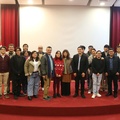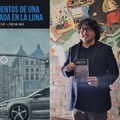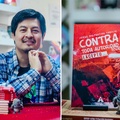The Mario Vargas Llosa Novel Biennial brought many Spanish-speaking writers to Lima. From Seville, Spain, the Peruvian writer Fernando Iwasaki brought a little humor to one of the round tables where he participated to talk about literature and technology.
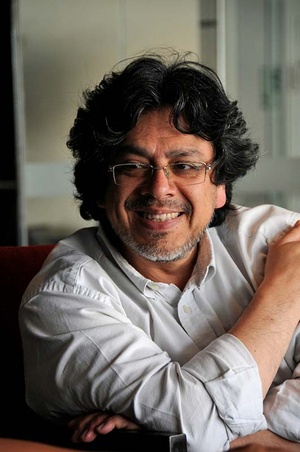
Fernando Iwasaki Cauti (Lima, 1961) is a historian, essayist and author of more than a dozen books. Since 1989 he has lived in Seville, Spain, where he directs the Cristina Heeren Foundation of Flamenco Art.
To write about a writer is to pigeonhole him in a limited series of biographical facts and definitions that barely bring us closer to his work and his identity. Fernando Iwasaki Cauti (Lima, 1961) is a historian, essayist and author of more than a dozen books in which he has moved like a capricious chess piece on the board of literary genres.
He was born in Lima but his grandparents were Japanese, Italian and Ecuadorian. Since 1989 he has lived in Seville, where he directs the Cristina Heeren Foundation of Flamenco Art. There could end the review of the flaps of his books, on which he can appear with a frown and a scarf, or with his legs crossed and his hands together, in the lotus position like a yogi.
Inside them, you can find pages where love and humor travel. History and imagination. Football and technology. Peru, Japan and Spain, as in the essay titled My poncho is a flamenco kimono . Or in the stories of Spain, take these awards away from me , whose cover has a bull surrounded by ninjas with the flag of the rising sun on the horizon.
Countries and writers
“Who doesn't have a Japanese last name?” jokes Fernando Iwasaki when I ask him about the identity of a Peruvian writer with a slight Spanish accent and a Japanese last name. “Outside Peru I realized how striking it was to have a Japanese family line. There are countries where having a single identity is highly valued, but in my case there are several at the same time, which is something that can be exploited in many ways.”
His essays, stories, novels and chronicles reflect the mix of cultures that form his literary DNA. There are the authors that he admires since when he studied history at the Catholic University (Jorge Luis Borges, Julio Cortázar, Julio Ramón Ribeyro), to whom he is related (Augusto Monterroso, Juan José Arreola, Guillermo Cabrera Infante) or of whom he writes (Alberto Hidalgo, Vicente Huidobro, Mario Vargas Llosa).
His recent book, Desleídos y efervescentes , is about these last three, a series of unpublished columns (and others published in the “Artes y Letras” supplement of the newspaper El Mercurio) where he “reflects on the unread and forgotten works of authors that no one or "Very few remember, as well as the books in full effervescence, by current writers who are at their best," according to the back cover.
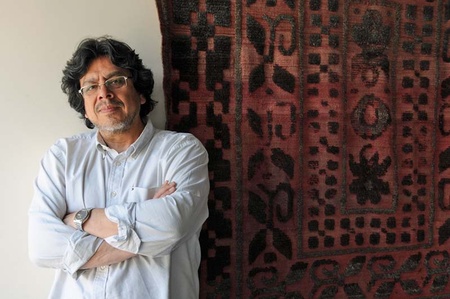
“Outside Peru I realized how striking it was to have a Japanese family line. There are countries where having a single identity is highly valued, but in my case there are several at the same time, which is something that can be exploited in many ways,” says Iwasaki.
Laughter and prizes
Precisely, Iwasaki returned to Lima in full Vargasllosian effervescence. The biennial that bears the name of the 2010 Nobel Prize in Literature invited him to participate in the round table “Writing literature in a technological world”, together with Abelardo Sánchez León, JJ Armas Marcelo and Piedad Bonnett. There, Fernando read a text that unleashed several laughs and an unbeatable compliment.
“Talent is always very fun,” Armas Marcelo told him after the stimulating text that amused Sánchez León and made Bonnett blush. That speech about technology and sex (which ran between lexicon and digital semantics, virtual falling in love and the lonely habits of netizens) was a prize for those who went to hear it at the University of Lima.
Those who did not make it to the appointment can watch, instead, the video posted on YouTube titled “How to prepare micro-stories,” in which he appears dressed as an itamae in his kitchen, with a hachimaki on his forehead and the necessary ingredients (and books) of his literary cooking class for the 1st Ciudad Mínima Festival in Guayaquil, where he advises that to write short texts an egg is essential, “which gives flavor and structure,” among other tasty and fun metaphors.
Technology and literature
Iwasaki wears a light blue jacket, like the sky of Lima in an off-season summer, when he addresses an audience of young people and adults who love technology and literature (some carry cell phones to take photos of him, others carry books for him to sign). ). He prefers the latter. “I'm not against technological progress, it's just that I'm useless with computers,” he tells me one day before his talk at a Miraflores hotel.
“Technology is wonderful, but when there is human creativity,” reads the writer to whom an online newspaper attributes the book A Declaration of Honor (instead of A Declaration of Humor ), an online essay in which he points out that He has won a prize that he never received and another that indicates that he is a doctor, when he confesses that he has not yet defended his thesis (to avoid doubts, consult his official website).
Without Twitter or Facebook, and in a country house that forces him to drive to get to the train station, Iwasaki leads an almost bucolic life in which he feels safe, especially when he realizes that traffic in Lima is still so chaotic. His work at the Cristina Heeren Foundation also allows him to stop thinking as a writer. Disconnect from the literary and academic world. Live.
Travel and identity
The stay in Lima is short, but it gives him time to visit his mother and meet with his writer friends whom he doesn't see as often. A couple of years ago, Fernando Iwasaki traveled to Japan to talk about the work of José Watanabe, Augusto Higa Oshiro and Carlos Yushimito at the Cervantes Institute in Tokyo. The title of the dissertation was “The complicity of the eye in Peruvian literature.”
“Peruvian writers of Japanese descent have things in common. I think not enough has been written about what the Japanese colony suffered during World War II. It is a topic that interests me a lot,” adds Iwasaki, who took advantage of the trip to Japan to tour for a future novel about his grandfather, a Japanese soldier. A novel that I have been thinking about for more than 10 years.
That book, as planned and postponed as some trips, now returns in the conversation in the lobby of his hotel, but Fernando clarifies that he has no time left to write novels, for which he needs many hours of dedication. Perhaps while you are packing your suitcase before leaving, or when you are on your plane, another story from those countries that you carry in your literary DNA will occur to you, in the sky without borders.
* This article is published thanks to the agreement between the Peruvian Japanese Association (APJ) and the Discover Nikkei Project. Article originally published in Kaikan magazine No. 86, and adapted for Discover Nikkei.
© 2014 Texto: Asociación Peruano Japonesa; © 2014 Fotos: Asociación Peruano Japonesa / José Chuquiure



